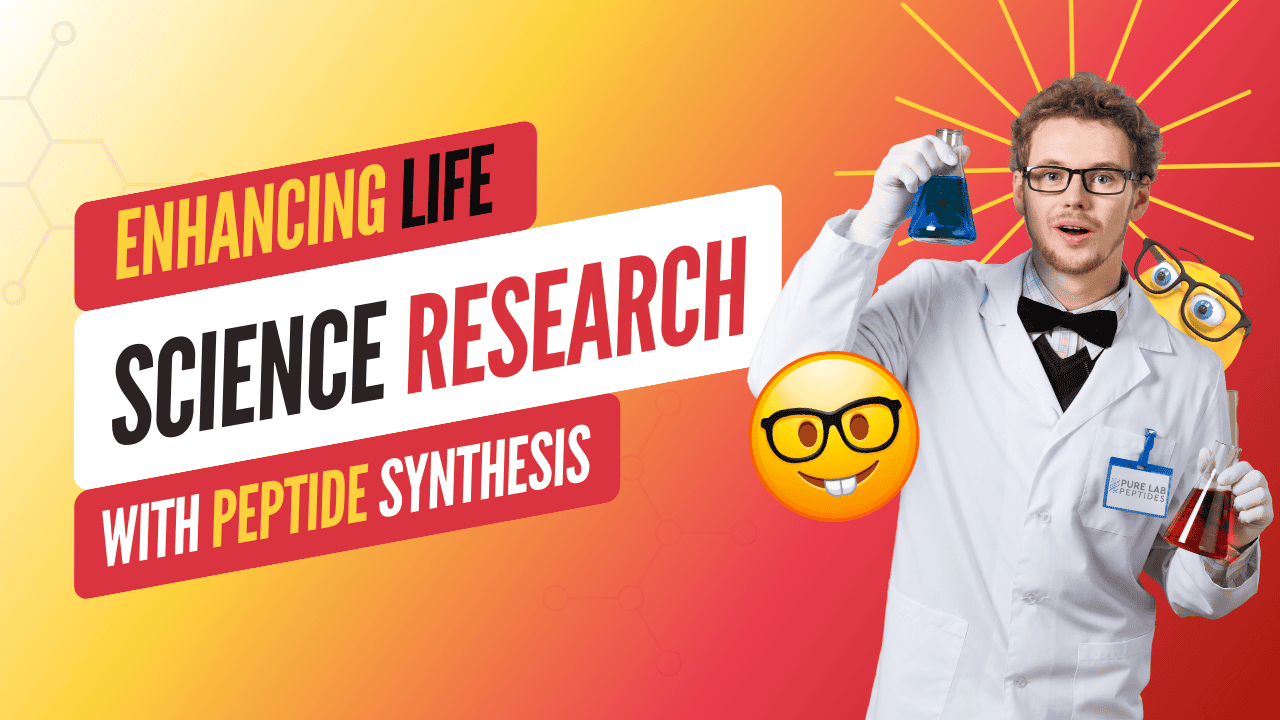

Peptides. You’ve likely heard the term thrown around in health and beauty circles, but what exactly are they?
Why should you care about this mighty molecule?
In this comprehensive guide, we’ll delve into the fascinating world of peptides—exploring their benefits, uses in therapy, and crucial role in skincare.
This article is your one-stop resource to understand why peptides are a game-changer in various fields and how you can harness their power for better health and beauty.
Peptides are short strings of amino acids, which are the building blocks of proteins. Think of them as small chains of amino acids, like beads on a bracelet, which combine to form larger protein molecules. They are essential to many bodily functions, from growth to repair. Peptides are involved in almost every process in the human body.
Peptides are made when two or more amino acids are linked by a peptide bond. This bond is formed during protein synthesis, where these amino acids come together in a specific sequence to create diverse peptides. The magic happens within our cells, where different peptides are produced based on the genetic code.
While both peptides and proteins are composed of amino acids, proteins are much longer chains. This makes them significantly larger molecules. Essentially, peptides are small; proteins are big. Because of their size, peptides are often easier for the body to absorb than proteins, providing quicker benefits.
Peptides are naturally produced within the body, but they can also be synthesized in labs. The naturally occurring peptides, like collagen peptides, play an essential role in bodily functions. On the other hand, synthetic peptides are formulated for targeted purposes, such as skincare products or muscle-building supplements.
One common misconception is that peptides can only benefit bodybuilders. While it’s true that certain peptides help build muscle, their range of uses is incredibly vast. From skincare to cognitive enhancement, peptides offer numerous benefits beyond the gym.
The benefits of peptides are far-reaching. They can help stimulate collagen production, repair muscle tissue, and improve skin elasticity. In essence, peptides play an essential role in maintaining and enhancing overall health.
Incorporating peptides into your daily routine can provide significant health benefits. These small peptides can help boost collagen production, improve skin health, and enhance muscle repair. Peptides can also positively impact mood and cognitive function.
Yes, peptides can help athletes. Some peptides, such as growth hormone peptides, stimulate muscle growth and repair, aiding in quicker recovery times and improving overall performance. Athletes often use peptide injections or peptide supplements to get these benefits.
Believe it or not, peptides may help with mental health too. Certain peptides are involved in neurotransmission processes that regulate mood, cognitive function, and even stress responses. Imagine feeling sharper and more alert just by incorporating peptides into your routine.
It’s always good to consult a healthcare professional before starting any peptide regimen. While peptides provide numerous benefits, synthetic peptide and peptide hormone use must be monitored to avoid any adverse effects.
Peptide therapy involves using scientifically formulated peptides to target specific issues, like aging or chronic pain. The idea is simple: use the body’s own building blocks for repair and rejuvenation, a bit like giving nature a helping hand.
Peptide therapy has shown promise in slowing down the signs of aging by promoting collagen and elastin production. Imagine having a peptide-infused serum that can reduce lines and wrinkles, making you look and feel years younger.
In simple terms, peptide therapy works by introducing specific peptides to the body to trigger certain responses, such as increased collagen production or muscle repair. This is usually done through peptide injections or topical applications.
The science of peptide therapy is fascinating. Researchers have identified various bioactive peptides that serve different roles. For instance, collagen peptides may help improve skin elasticity, while antimicrobial peptides can fight infections.
Growth hormone peptides, collagen peptides, and different bioactive peptides are among the most popular types of peptides used in therapy. Each has its own set of benefits, ranging from muscle growth to improved skin health.
Using peptides for skin health is like giving your skin a mini-facelift. Peptides can stimulate collagen and elastin production, improve the skin barrier, and reduce skin aging signs. Peptides can also help repair skin damage and maintain healthy skin.
If you’re worried about those pesky lines and wrinkles, look for peptides like copper peptides and collagen peptides. These peptides are often found in high-quality skincare products that work wonders for anti-aging.
Peptide-infused skincare products are backed by science. These products can significantly improve skin health, reduce wrinkles, and offer other anti-aging benefits. Essentially, they are a game-changer in the skincare world.
Yes, peptides are generally safe for all skin types. However, it’s always good to do a patch test with any new skincare product containing peptides to ensure you don’t have any adverse reactions.
While peptides can’t exactly replace Botox, they offer a non-invasive alternative that can improve skin elasticity and reduce wrinkles over time. Think of peptides as your skin’s best friend that helps keep it looking youthful and radiant.
Proteins are the building blocks of life. They are large molecules composed of smaller amino acids. They play a crucial role in muscle growth, tissue repair, and overall health. Without proteins, our bodies would lack the structural framework needed for basic functions.
Peptides are small fragments of proteins, making them easier to absorb. Think of peptides as bite-sized pieces of protein that the body can quickly utilize for various functions, from muscle repair to hormone production.
Collagen is a protein that acts as a scaffold to provide strength and structure. It’s found in our skin, muscles, tendons, and ligaments. It’s what keeps our skin looking plump and youthful.
Collagen peptides are hydrolyzed forms of collagen, making them easier for the body to absorb. While regular collagen is effective, collagen peptides take it up a notch by providing quicker and more efficient results.
Collagen peptide supplements may help improve skin elasticity, reduce wrinkles, and strengthen hair and nails. They are also beneficial for joint and bone health. Think of them as your go-to supplement for overall wellness.
Peptide supplements are dietary products that contain specific peptides aimed at providing various health benefits. They can come in the form of powders, pills, or even drinks.
Yes, peptide supplements have been shown to be effective for various purposes, from improving skincare to enhancing muscle growth. However, it’s essential to choose supplements from reputable brands.
Look for peptide supplements that are clinically tested and contain peptides known to provide the benefits you seek. Always check the ingredient list and consult with a healthcare provider for personalized advice.
Absolutely! Peptide supplements containing growth hormone peptides or creatine peptides can significantly enhance muscle mass and strength, aiding in faster muscle recovery and growth.
While peptide supplements are generally safe, misuse can lead to side effects such as headaches, dizziness, and gastrointestinal issues. Always follow the recommended dosage and seek medical advice if needed.
There are numerous peptides, each serving unique functions. From collagen-stimulating peptides to those that enhance cognitive function, the world of peptides is incredibly diverse.
Synthetic peptides are designed in laboratories to mimic naturally occurring peptides. These peptides are popular in various treatments, including peptide therapy and skincare.
Endogenous peptides are naturally produced within the body, whereas exogenous peptides come from outside sources, like supplements or foods containing peptides. Both types play crucial roles in maintaining health.
Bioactive peptides, collagen peptides, and growth hormone peptides are among the most sought-after types. Each offers unique benefits, from improving skin health to enhancing athletic performance.
To identify quality peptides, look for products that have undergone rigorous testing and are sourced from reputable manufacturers. Verified purity and efficacy are essential when choosing peptides.
Peptide injections involve administering peptides directly into the bloodstream for quicker absorption and effectiveness. This method is often used in medical and athletic settings.
Peptide injections are generally safe when administered by a healthcare professional. However, improper use can lead to complications, so it’s crucial to consult a doctor beforehand.
Peptide injections offer faster and more concentrated effects compared to oral supplements. They are especially useful for targeted treatments like muscle repair or anti-aging.
Before receiving peptide injections, it’s essential to consult with a healthcare provider to determine the appropriate type and dosage. Follow any pre-injection guidelines provided by your doctor.
Peptide injections are used in treating chronic pain, enhancing athletic performance, and even slowing down the aging process. They offer a versatile approach to various medical conditions.
Peptides like growth hormone peptides are often used in weight loss programs to enhance fat loss and muscle gain. They help optimize body composition, making weight loss more effective.
Athletes use peptides to speed up muscle repair and reduce recovery times. Peptides like creatine peptides and collagen peptides are common among professional athletes.
Peptides play a pivotal role in managing chronic diseases like arthritis and diabetes by reducing inflammation and supporting overall health. It’s a burgeoning field with promising prospects.
Certain peptides can improve cognitive functions such as memory, focus, and mental clarity. Nootropic peptides are now gaining popularity for their brain-boosting effects.
Peptides have potent anti-inflammatory properties, making them beneficial in treating inflammatory conditions and promoting overall health. This is one of the most exciting uses of peptides in modern medicine.
Recent breakthroughs in peptide research have unveiled new therapeutic uses, such as cancer treatments and regenerative medicine. It’s an exciting frontier for modern science.
Peptides are increasingly being used in drug development for their ability to target specific cells and tissues. This makes them ideal candidates for precision medicine.
Peptides are used to treat a variety of conditions, including skin aging, chronic pain, and hormonal imbalances. Their versatility makes them invaluable in modern medicine.
Peptides can target cancer cells without harming healthy tissues, making them promising candidates for cancer therapy. They can also enhance the effectiveness of traditional cancer treatments.
The future of peptides in medicine looks incredibly promising, with ongoing research exploring new therapeutic peptides and their potential applications in various fields.
Peptides enhance wound healing by stimulating collagen production and tissue repair. They accelerate the healing process, making them invaluable in medical settings.
Yes, certain peptides play a role in modulating the immune system. Antimicrobial peptides can improve immunity, making the body more resilient to infections and diseases.
Peptides are involved in the regulation of hormones like insulin and growth hormone. They can help maintain hormonal balance, which is crucial for overall health.
Bioactive peptides can improve gut health by enhancing the integrity of the gut lining and promoting beneficial bacteria. This leads to better digestion and overall health.
Peptides may also improve sleep quality by regulating sleep cycles and reducing stress levels. A good night’s sleep can significantly improve your overall health and well-being.
Adding foods that contain peptides, like eggs, dairy, and meat, can naturally boost your peptide levels. Supplements can also provide targeted benefits.
Absolutely! Peptides are not just for humans. Pets can also benefit from peptide supplements and therapies, especially for joint health and muscle repair.
Yes, many foods naturally contain peptides. For example, milk contains bioactive peptides that promote health. Foods rich in protein, like collagen and elastin, are excellent sources of peptides.
From skincare serums to dietary supplements, many everyday products now contain peptides. This makes it easier than ever to reap their benefits in daily life.
Simple lifestyle changes, like improving your diet and reducing stress, can enhance the effectiveness of peptides. Think of it as creating a conducive environment for peptides to work their magic.
Peptides are indeed a marvel of modern science. By understanding and incorporating peptides into your routine, you open doors to better health, improved skin, and a more vibrant life.
Peptides are essential to various biological processes. They act as the building blocks of proteins, aiding in muscle repair, immune responses, and hormonal balance. For example, collagen peptides may help boost skin elasticity and reduce wrinkles. Their unique abilities come from their structure as short strings of amino acids.
For most people, peptides are safe when used appropriately. They offer substantial benefits, such as improved skin health and muscle repair. However, misuse, especially with synthetic peptides, can lead to side effects like dizziness and headaches. Always consult a healthcare provider before using peptide products or dietary supplements.
Foods rich in peptides include eggs, dairy, meat, and fish. These foods naturally contain peptides that help in various bodily functions. Bioactive peptides, which have health benefits, are especially abundant in fermented dairy products and certain types of fish.
No, peptides are not steroids. They are short chains of amino acids that naturally occur in the body. Unlike steroids, peptides are often used to promote natural processes like muscle growth and skin repair, without the severe side effects associated with steroid use.
Among foods, dairy products like cheese and yogurt are particularly rich in peptides. Fermented foods also contain peptides from the breakdown of proteins during fermentation. These foods offer a natural way to increase peptide intake.
You can increase peptides in your body by consuming peptide-rich foods such as eggs, dairy, and meat. Additionally, peptide supplements and skincare products containing peptides may help. Regular exercise can also stimulate the body to produce peptides naturally.
Rich sources of peptides include dairy products, eggs, fish, and meat. These foods contain peptides in forms that the body can easily absorb and utilize. Including these in your diet can help you harness the power of peptides for overall health.
While fruits aren’t generally high in peptides, some fruits like bananas have specific peptides that aid in immune responses. Including a variety of fruits in your diet can complement peptide-rich foods, contributing to overall well-being.
Taking peptides can sometimes lead to side effects such as headaches, dizziness, and gastrointestinal issues, particularly with synthetic peptides. Misuse or overdosage is a common concern. Always consult a healthcare provider before starting any peptide regimen.
Peptides, while beneficial, can have disadvantages. Risks include side effects from synthetic peptides and the potential for allergic reactions. The body may not always absorb these peptides as efficiently as intended, which could limit their benefits. Always seek professional guidance to mitigate these risks.
Dr. Richard DiMarchi is a distinguished scientist renowned for his transformative work in peptide chemistry and endocrinology. With over 35 years of experience, Dr. DiMarchi has made pivotal contributions to the understanding and development of peptide therapeutics, particularly in the areas of diabetes and obesity. Known for his innovative approaches, Dr. DiMarchi has significantly advanced peptide hormone research and synthetic peptide design.
Dr. DiMarchi’s notable publications include:
Dr. DiMarchi’s work is characterized by its innovative approach and rigorous scientific methodology, earning him numerous accolades, including the prestigious ACS Award in Medicinal Chemistry. His contributions underscore the authority and trustworthiness of peptide research, making him a respected figure in the scientific community.
Dr. Sam Gellman is a leading researcher in the field of peptide chemistry, known for his groundbreaking work on the structure and function of peptides. With a strong background in bioorganic chemistry, Dr. Gellman has advanced our understanding of peptide folding and stability, which has significant implications for therapeutic design and development.
Key publications by Dr. Gellman include:
Dr. Gellman’s commitment to exploring innovative peptide structures has earned him numerous awards, including the Ralph F. Hirschmann Award in Peptide Chemistry. His meticulous research and pioneering work in peptide science contribute significantly to the field’s trustworthiness and authority. Dr. Gellman’s contributions are instrumental in advancing the practical applications of peptide technology across various domains.
Ahrens, V. M., Bellmann-Sickert, K., & Beck-Sickinger, A. G. (2012). Peptides and peptide conjugates: therapeutics on the upward path. Future Medicinal Chemistry, 4(12), 1567–1586. https://doi.org/10.4155/fmc.12.76
Kabelka, I., & Vácha, R. (2021). Advances in molecular understanding of Α-Helical Membrane-Active peptides. Accounts of Chemical Research, 54(9), 2196–2204. https://doi.org/10.1021/acs.accounts.1c00047
Lee, H., Kim, H., & Lee, S. (2021). Self-Assembling peptidic bolaamphiphiles for biomimetic applications. ACS Biomaterials Science & Engineering, 7(8), 3545–3572. https://doi.org/10.1021/acsbiomaterials.1c00576
Ma, H., & Cao, M. (2022). Designed peptide assemblies for efficient gene delivery. Langmuir, 38(45), 13627–13634. https://doi.org/10.1021/acs.langmuir.2c02197
Moruz, L., & Käll, L. (2016). Peptide retention time prediction. Mass Spectrometry Reviews, 36(5), 615–623. https://doi.org/10.1002/mas.21488
Myšková, A., Sýkora, D., Kuneš, J., & Maletínská, L. (2023). Lipidization as a tool toward peptide therapeutics. Drug Delivery, 30(1). https://doi.org/10.1080/10717544.2023.2284685
Paulussen, F. M., & Grossmann, T. N. (2022). Peptide‐based covalent inhibitors of protein–protein interactions. Journal of Peptide Science, 29(1). https://doi.org/10.1002/psc.3457
Seebach, D., & Gardiner, J. (2008). Β-Peptidic peptidomimetics. Accounts of Chemical Research, 41(10), 1366–1375. https://doi.org/10.1021/ar700263g
ALL ARTICLES AND PRODUCT INFORMATION PROVIDED ON THIS WEBSITE ARE FOR INFORMATIONAL AND EDUCATIONAL PURPOSES ONLY. The products offered on this website are intended solely for research and laboratory use. These products are not intended for human or animal consumption. They are not medicines or drugs and have not been evaluated or approved by the FDA to diagnose, treat, cure, or prevent any disease or medical condition. Any form of bodily introduction is strictly prohibited by law.




Discount Applied Successfully!
Your savings have been added to the cart.